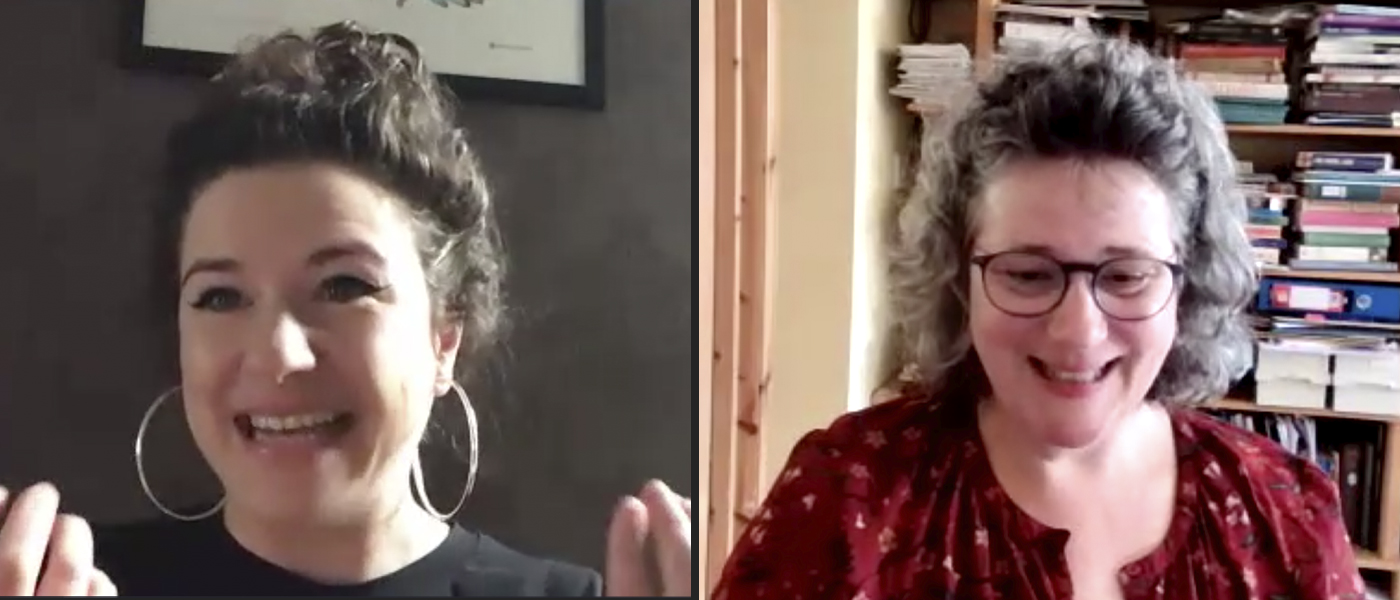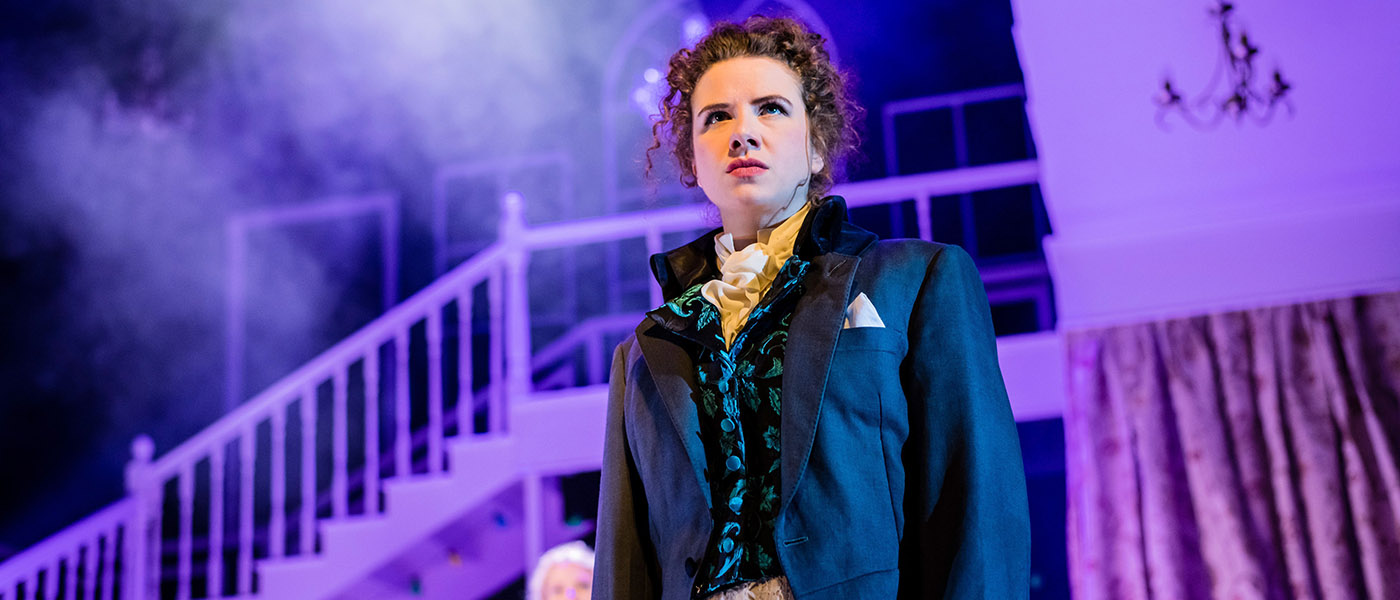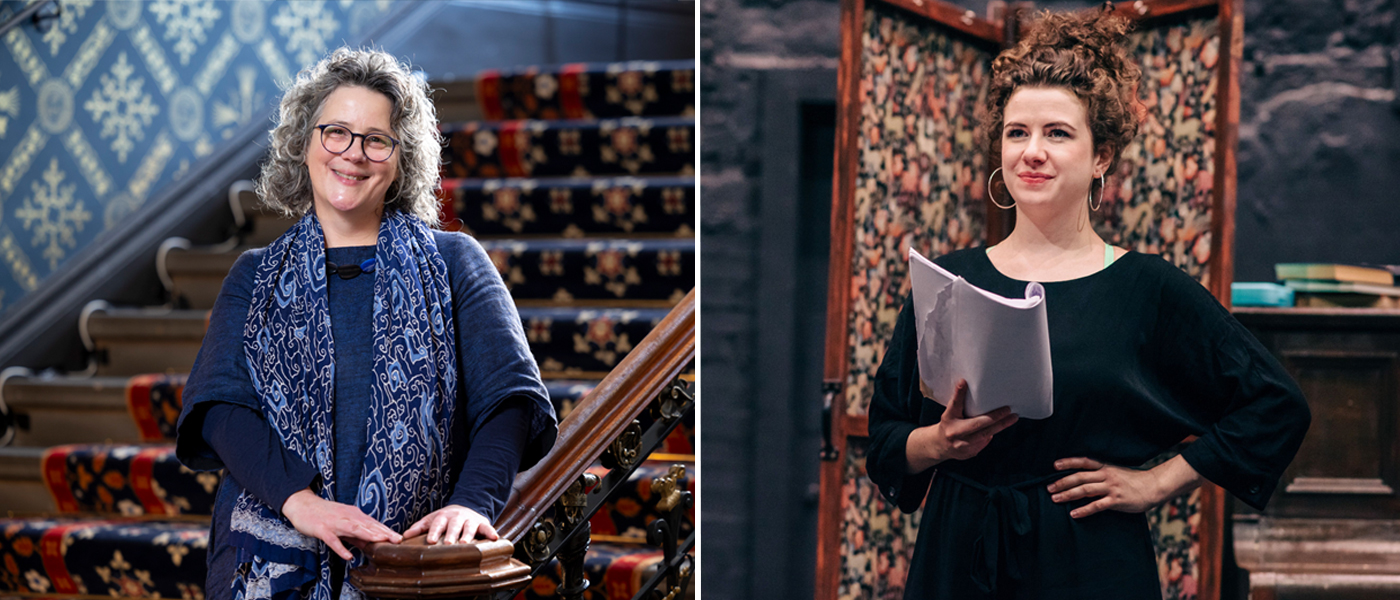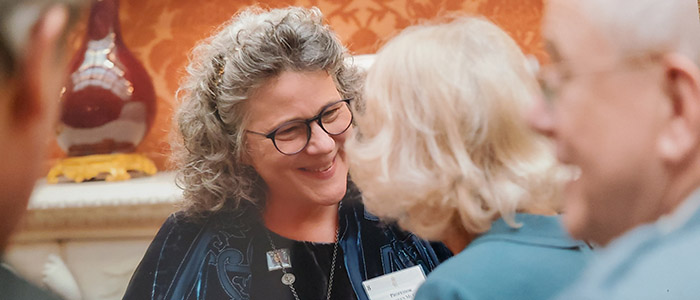In conversation: From page to stage
What would it be like to chat to your old University lecturer about how their subject changed your life? The paths of Isobel McArthur (MA 2013) and Professor Kirsteen McCue (MA 1989) first crossed in 2009; recently, we brought them back together to discuss how Isobel’s degree in Scottish Literature turned out to be a launchpad to a stellar career as an actor and playwright. Her show 'Pride & Prejudice* (*sort of)' won an Olivier Award for Best Comedy in 2022, while Kirsteen is a part of the core team of academics at our Centre for Robert Burns Studies.

Isobel McArthur and Professor Kirsteen McCue held their lively conversation over Zoom.
Isobel: I can vividly remember the sense of welcome we got from the Scottish Literature department when we started. I had notions of doing theatre and French at Uni, but thank God for Scot Lit, because it ended up being my whole degree. That was thanks to the personalities in the department.
Kirsteen: That’s funny, because I wanted to do drama and music at first, or music and Italian. But the same thing was true for me – Scot Lit got me, and the light came on. Douglas Gifford joined the staff when I was going into honours, and that was it. He was just fantastic – one of those individuals that changes your life.

Isobel in her role as Mr Darcy in 'Pride & Prejudice* (*sort of). [Photo: Mihaela Bodlovic]
Isobel: As students, it felt like we were never an inconvenience to the Scot Lit department. I felt that I could have my own individual takes on things, and there was space and time to entertain them. That just makes for a transformative education that you really feel you have a stake in.
Kirsteen: Yeah, I think that's the thing – we are the only unit of Scottish literature in the world that works in the way that we do, and as academics, we’re doing what we do because we feel so passionate about it. These subjects are always under threat because the numbers are small – but it’s important to keep them alive. The arts and humanities enrich people’s lives. What do you think your degree has given you, as a basis for the creative future that you're having right now? You're very fluent and exciting with what you do with Scots language!
Isobel: Well, I suppose it all started to become part of one comprehensive philosophy about theatre and literature, which was about creating points of access. That would seem to be the most useful thing I can do with my professional life, and if I've achieved that by the time it's over, then I'll feel contented. When it comes to Scots or Gaelic, I think it's the same thing. The most recent thing I did relevant to that was Robert Louis Stevenson’s Kidnapped, with the National Theatre of Scotland (NTS). It was so important that the Scots and Gaelic in it had to be natural and instinctive. Occasionally, someone from NTS would say to me, “But how are audiences going to understand? How are you going to translate?” And I was like, “We won't need it! People will be able to come away singing, you know, ‘Road to Nowhere’ in Gaelic,” or whatever. It was about just making sure that it all felt like a natural tapestry – then people engage.
Kirsteen: And it's just such a cracking story, Kidnapped. It has such a momentum about it, and it really bounced in that production. The characters came alive. It's a wonderful gift to be able to do that – to open the door on a classic work of fiction.
Isobel: Absolutely. There's so many riches there. In many schools of thought, we associate a reader being bamboozled as somehow indicative of the art's intellectual prowess. And actually, I feel the opposite.
Kirsteen: One of the places where our paths have crossed was a commission you did for COP26 [the UN Climate Change conference which was held in Glasgow in 2021] – a Scots language poem for the Dunedin Consort [one of the world’s leading baroque ensembles], which I was on the board of at the time. You worked with UofG composer Drew Hammond and wrote a beautiful poem called 'Yince a Paradise' [see right], which was set as a choral work, and it toured around the time of COP 26. It's a short, simple lyric about understanding the impact that we have on the natural world. It was a fabulous thing to work on together.
"Just imagine a single moment in the future when you have to tell a child that the world used to be beautiful. That was the whole idea of the poem, from start to finish.” –Isobel
Isobel: Oh, thank you. It was a unique opportunity, compared to a lot of the stuff I would ordinarily do. But it was so moving to then hear this piece of music at the end.
Kirsteen: It was. It was really powerful, and for me, it was a kind of legacy piece for some of the poetry that you would have covered as a student with us.
Isobel: Yeah. And you can only approach something like that if you've had previous access to it.
Kirsteen: You wouldn’t have had the confidence otherwise, would you? It’s one of the big discussions about the importance of Scots as a language and making people feel confident in using it. Your poem has wonderful Scots words in it, and a few that somebody might have to look up. But when you hear it out loud, you know it's your language. It was a lovely thing to be to be involved in.
Isobel: That's extremely kind. It might sound trite, but the sheer generosity and enthusiasm of you and your colleagues was something that allowed me to feel that I deserved to be at Glasgow, and that one day I could hope to contribute to Scottish literature as a writer in my own right. It takes an awful lot to give a student that degree of self-belief, and it's quite hard to enumerate everything that I feel like I owe.
Kirsteen: That's just lovely to hear.
Isobel: Completely heartfelt.
Kirsteen: Thank you – if I thought I'd done that for one person, I would feel as if life was worthwhile, really! Did you have an idea of where you were going after graduation?
Isobel: It was always theatre, from when I was very young. I went to every crappy local church hall drama group going. The Student Theatre Society at Glasgow was a really welcoming place for me as well, where literally everybody had a role to play. But yeah, I wanted to act, for sure, so after I graduated, I did a one-year acting MA at the RSAMD. And I'm now a playwright myself probably more of the year than I'm an actor, because that's how it works. Everyone needs good playwrights, and the acting profession is over-subscribed.
When you see graduates like you go on to do something of such high quality, engaging new audiences with the thing that you feel so passionate about yourself – it doesn't get better than that, really." –Kirsteen
Kirsteen: So what’s the thing you've been proudest of so far?
Isobel: Well, people go on about the blinking Olivier (!) But the nice thing is, we had two weeks at the Tron in Glasgow, and then, six years later, that show’s still touring. It's been translated into nine languages now and performed all over the world.
Kirsteen: Wow!

[Photo of Isobel, right: Mihaela Bodlovic]
Isobel: I'm proud of the Glaswegian and Scottish origins of that piece. Every time I launch into a project with all my heart, I try and do everything better than I did the last time. Then the show opens, the press come and sit in the room, and the next morning they tell me: “She's done it again.” “She's not done it again.” “She's stupid.” “She's clever.” “She's funny.” “She's unfunny.” And you just have to go, “OK! Thanks.”
Kirsteen: Yeah. What you have to remember is, who are the people that are coming to the theatre – and are THEY enjoying it? Because actually, they're who matter. Not the critics.
Isobel: Totally. Can I ask you about your prize as well?
Kirsteen: Ooh! Well, from an Olivier to the Queen's Anniversary Prize, which we won as the Centre for Robert Burns Studies. There's a lot still do with Burns; he gets knocked a lot because he's ‘done to death’ – but academically, he's not. We want him to be recognised along with Wordsworth, Keats, Shelley and Byron as somebody who was a major figure, because he was.
Isobel: Yeah, I hosted a Burns night this January for 15 or 20 people – my first one in this South London context. And I thought, right, I'll do all the traditional stuff. I said, “I'll do the Address to the Haggis, unless somebody else wants to?” And they were like, “We don't even know what you’re talking about. A dress?” To them it was all terribly exotic. Even in an environment of people who live in a very multi-dimensional cultural landscape here in London, it was all brand new to them, every aspect of the tradition.
Kirsteen: And what you did is the best way to do it as well – having that kind of gathering in your own house, just with your mates or family. That's the ideal Burns Night for me. The big dinners – and I've had to do many of them – they’re great in themselves, but I always feel that the ones I enjoy most are where folks kick back the chairs and get their fiddles out, you know – just a very intimate gathering.

Kirsteen with the Queen at the recent Queen's Anniversary Prize award ceremony at Buckingham Palace. [Photo: BCA Images]
Isobel: Well, I wish you all the very best with your, what probably feels like quite epic, research! But I know it'll be joyful as well.
Kirsteen: Honestly, it's been such a lovely opportunity to see you again, Isobel. We're very proud of you.
Isobel: Well, such as I’m allowed to be, I’m very proud of you guys as well.
Kirsteen is currently on research leave, focusing on a scholarly edition of one of the very first biographies of Robert Burns, written in the 1820s, and Isobel's adaptation, 'Pride & Prejudice* (*sort of)' begins a new UK-wide tour this autumn.
This article was first published June 2024.
Dunedin Consort collaboration
Isobel's work with the Dunedin Consort put her Scot Lit degree into action with the poem 'Yince a Paradise' ['Once a Paradise']. Written for the Glasgow COP26 conference, the poem, below, imagines a future of environmental destruction and the questions that children would ask their elders about why this was allowed to happen.
You can listen to a recording of the Dunedin Consort's choral production of Isobel's poem here.
Yince a Paradise
Noo whit isnae hackit doun or rotted is
Teemin
Bleezin
Reekin
Smeekin
Earth
Still bonnie?
Whit time's it noo
Hoo soon you'll be sayin
Whit ahd give tae be able tae dicht the sklate
Fae forefowk tae granbairns
We mairch them strecht intae the baivie deef tae thur cownin
Yin day
Forrit an ayont
Yin bairn will ask ‘Is it true that aw this ash an reek
Wis yince a paradise?’
They’ll jist no believe how it wis afore
Oor how we chose tae end the screed

